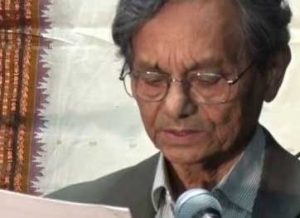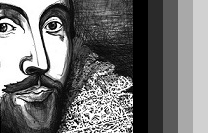Monday,13,2018
 Prof. Tirthankar BoseSimon Fraser University, Burnaby BC Canada(Interviewed by Sri Abhishek Sarkar via e-mail)
Prof. Tirthankar BoseSimon Fraser University, Burnaby BC Canada(Interviewed by Sri Abhishek Sarkar via e-mail)Year of passing B.A. and M.A.
1957, 1959.Details of institutions concerned.
Presidency College and Calcutta University.When did your first encounter with Shakespeare take place (at school or college)?
At home.College and university syllabi. Who taught?
B.A. – Professors Tarapada Mukherjee, Subodh Chandra Sengupta, Taraknath Sen, Priyatosh Bagchi.M.A. – Professors Taraknath Sen, Subodh Chandra Sengupta, Prabodhchandra Ghosh (CU), Krishnachandra Lahiri (CU).How was Shakespeare taught?
I presume this question concerns teaching strategy and emphasis on areas of Shakespeare studies; here is what I remember:Mainly directed at comprehension of the text, which for most teachers meant the meaning and signification of the text (viewed as the meaning of unfamiliar words to interpretive explication, e.g., the meaning of “multitudinous seas incarnadine”), character study, study of themes, and some analysis of the language and style (e.g., Tarak Babu’s famous discussion of the punctuation of Lady M’s “We fail” and his even more original views on the short line in Shakespeare).What traits of any particular teacher impressed you most?
Professor Taraknath Sen’s extraordinary ability to explicate the text. Professor Subodhchandra Sen’s incisive discussion on intellectual trends in Shakespeare studies. Professor Tarapada Mukherjee’s power to get students interested in the text through his infectious passion for Shakespeare. Professor Prabodh Ghosh’s character studies.Did the teacher enact the scenes in the class room?
No. Presidency College tradition had it that one of the former greats, Percival sahib or James sahib, walked into his class waving some branches above his head, crying our “Birnam wood to Dunsinane comes,” but alas, my profs were too Olympian to indulge in such levity. But Tarapada Babu’s reading was always compelling in its dramatic immediacy.Was the teacher very particular about pronunciation and accent?
No. My professors enunciated the text very clearly but spared us the tortured Oxbridge accent I have heard since then in Calcutta.Were expletives and sexual references omitted?
They were indeed. We read Verity and similar Brit school editions from the 19th c – none of that “a black ram is tupping your white ewe” stuff.How far was the socio-historical context of plays discussed?
Very little; not because our professors didn’t know the context, nor because they considered it unimportant but they were after all teaching with an eye to the exams, which were traditionally geared to narrowly focused explication and broad topics relating to themes and characters.Were Shakespeare’s contemporary dramatists given the same amount of importance in the classroom?
Only—occasionally—by Tarak Babu. Again, professors in general had to worry about “covering” the syllabus. Tarak Babu couldn’t care less about exams and the syllabus. Others certainly brought in contemporary material when I met them outside class.Were students encouraged to think independently and challenge the teacher?
Not in class. In private, yes, though “challenge” was not quite acceptable.Editions and critical material prescribed and used.
As I have said above, the editions were British school editions and very limited—no mention of variants, readings etc. until we achieved elevation to postgrad paradise. Some critical material referred to, but rather sparingly.The questions were invariably broad and banal, with not an ounce of critical challenge, and often repeated from previous years. Deadly dull and guaranteed to put young people off literature.
Examination and question pattern.
Exams, specially the set essays, promoted rote learning rather than independent thought. The obligatory section was “Explain with reference to the context,” context meaning the immediate context of action in the text. The questions were invariably broad and banal, with not an ounce of critical challenge, and often repeated from previous years. Deadly dull and guaranteed to put young people off literature.Did the teacher refer to stage and film productions of Shakespeare?
Not in my own experience. (From what I hear Professor Shanta Mahalanobis at Lady Brabourne was a rare exception.)Whether the text was related to performance conventions.
No. Bear in mind that I am from the stone age when performance studies were in their infancy.Whether there was any performance of Shakespeare at the institution.
Not at mine as far as I can recall.Account of classmates who later distinguished themselves as teachers, performers etc.
Too many to list. In my own year Bibhas Chakrabarty comes to mind, and among younger contemporaries Shamik Bandyopadhyaya, Rudraprasad Sengupta, Gayatri Spivack, Sukanta Chaudhuri and several others.Noticeable changes in Shakespeare pedagogy and student reaction over the decades.
If you mean at my college/university in Calcutta, I have no information after the 1970s.Do you think that Shakespeare is an overrated author?
Certainly not; but I don’t think he is god either.How would you react to the present trend of de-glamorizing and de-canonizing Shakespeare?
Enthusiastically, having done so for the past forty years.How would you react to the phenomenon of reading Shakespeare in a simplified language or in paraphrase, now popular among students in the West?
Popular among which students in the “West”? Certainly not mine (in Canada); I am not a believer in feeding adults baby food and in underestimating students.Any suggestion about who else may be profitably interviewed for our project?
I am sure you have a long list but I hope it includes respondents from disciplines other than English.PDF transcript Comments are closed.
